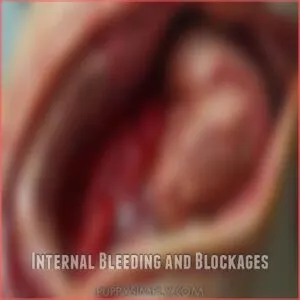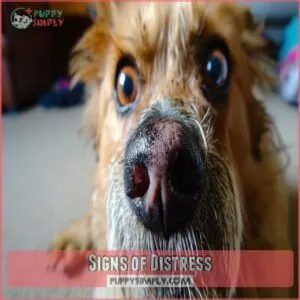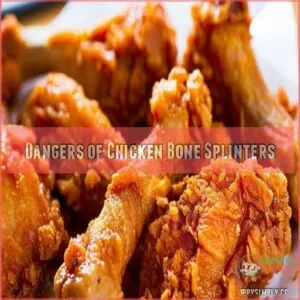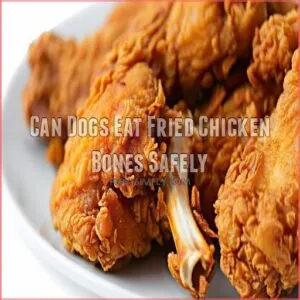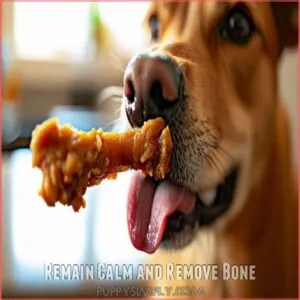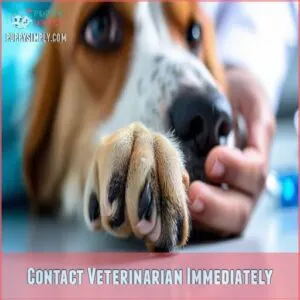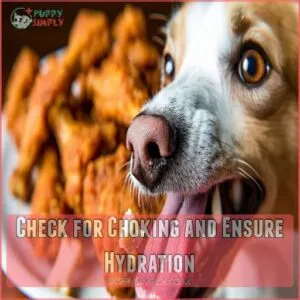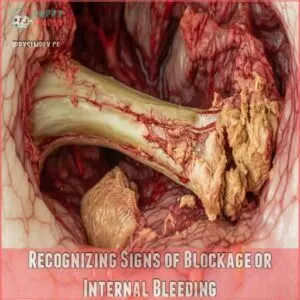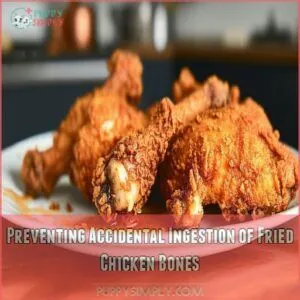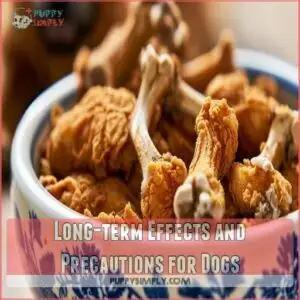This site is supported by our readers. We may earn a commission, at no cost to you, if you purchase through links.
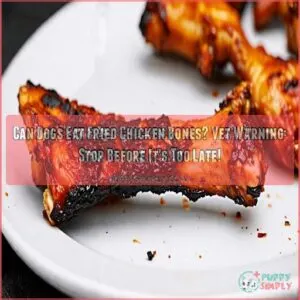
Even if your pup gives you those irresistible puppy eyes while you’re enjoying your crispy dinner, stay strong – their safety comes first.
If your dog accidentally swallows a fried chicken bone, don’t panic. There are specific steps you can take right away to protect them, and knowing these key first responses could make all the difference in preventing a scary situation.
Table Of Contents
- Key Takeaways
- Risks of Fried Chicken Bones for Dogs
- Can Dogs Eat Fried Chicken Bones Safely
- Immediate Actions if Dog Swallows Bone
- Recognizing Signs of Blockage or Internal Bleeding
- Preventing Accidental Ingestion of Fried Chicken Bones
- Follow-up Care and Veterinary Attention
- Long-term Effects and Precautions for Dogs
- Frequently Asked Questions (FAQs)
- Can dogs eat frozen chicken bones?
- Is it healthy to eat fried chicken?
- Can a dog eat chicken bone?
- Can dogs eat KFC chicken bones?
- Can dogs eat fried chicken?
- Can dogs eat chicken wing bones?
- What happens if my dog eats fried chicken bones?
- Can my dog eat a piece of fried chicken?
- Can I give KFC bones to my dog?
- Is it okay to feed chicken bones to dogs?
- How long does it take bones to digest?
- Will bread help pass chicken bones through?
- Can different dog breeds handle bones differently?
- What makes fried bones more dangerous than raw?
- Should I change my dogs diet after eating bones?
- Conclusion
Key Takeaways
- You shouldn’t let your dog eat fried chicken bones; just like baby back rib bones risks, they pose serious choking hazards and internal damage; they splinter easily, causing internal injuries.
- If your dog eats a fried chicken bone, contact your vet immediately; time is crucial.
- Watch for signs of distress like vomiting, diarrhea, or lethargy; these indicate potential problems.
- Prevent future incidents by keeping fried chicken bones out of your dog’s reach and disposing of them properly.
Risks of Fried Chicken Bones for Dogs
You’ll want to keep those fried chicken bones away from your dog since they can splinter into sharp fragments that tear through your pet’s digestive system, causing life-threatening internal bleeding and blockages.
If your furry friend manages to snatch a bone, you’ll need to act quickly and contact your vet right away, as every minute matters in preventing serious complications.
Internal Bleeding and Blockages
Every year, countless dogs end up in emergency vet clinics due to fried chicken bone complications. These bones can cause life-threatening internal bleeding and blockages in your dog’s digestive system. Cooked chicken bones, in particular, pose a significant risk of splintering and puncturing a dog’s digestive tract, potentially leading to severe internal injuries or blockages, as seen in the risks of cooked chicken bones.
Here’s what you need to know about these dangerous scenarios:
- Sharp bone fragments can pierce your dog’s intestinal walls
- Blockages can occur when bones get stuck in the digestive tract
- Internal bleeding might require immediate surgery
- Even small bone pieces can cause serious complications
Signs of Distress
After those scary internal injuries we discussed, let’s talk about what to watch for in your pup.
Your dog’s behavior will tell you if something’s wrong. Keep an eye out for lethargy – if your normally bouncy buddy’s acting like a couch potato.
Vomiting, diarrhea, and labored breathing are red flags you can’t ignore.
Notice your dog pawing at their belly? That abdominal pain needs immediate vet attention.
Dangers of Chicken Bone Splinters
The most dangerous aspect of fried chicken bones lies in their tendency to splinter.
Unlike raw bones, cooking makes them brittle and prone to shattering into sharp fragments.
These splinters can tear through your dog’s digestive tract like tiny daggers, potentially causing life-threatening punctures and internal bleeding.
The fragments can also lodge in their throat, creating a choking hazard that requires immediate veterinary attention.
Can Dogs Eat Fried Chicken Bones Safely
While dogs can technically eat and digest some types of bones, fried chicken bones are never safe for your furry friend.
Cooking makes these bones brittle and prone to splintering, creating sharp fragments that can tear through your dog’s digestive system, leading to potential obstruction risks and even causing a life-threatening puncture of the GI tract.
Unlike raw bones that might offer nutritional benefits, fried chicken bones pose serious health risks without any advantages.
You might think your dog’s powerful stomach acid can handle it, but these bones can cause life-threatening injuries.
It’s best to keep all chicken bones, especially fried ones, far away from your pup.
Immediate Actions if Dog Swallows Bone
If you’ve just caught your dog swallowing a chicken bone, don’t panic – your quick action in the next few minutes could prevent serious complications.
If you suspect your dog has ingested fried chicken bones, which could splinter like rib bones that can splinter, and cause serious internal injuries, contact your vet right away, as they’ll guide you through the necessary steps to keep your furry friend safe.
You’ll need to watch your pet closely for any signs of distress.
Remain Calm and Remove Bone
Catching your dog with a mouthful of chicken bones can send your heart racing, but staying calm is your best defense.
Take a deep breath – your composure helps keep your pup relaxed too.
Here’s what to do right away:
- Gently approach your dog without sudden movements
- Use a firm but quiet "drop it" command
- Carefully remove any remaining bones from reach
Remember, your steady nerves set the tone for handling this situation safely.
Contact Veterinarian Immediately
Your next move should be calling your veterinarian right away.
Don’t wait to see if things get worse – even if your dog seems fine, those chicken bones can cause serious problems.
Time is your best friend here.
Your vet might recommend bringing your pup in for a check-up or give you specific instructions to follow at home, depending on what they’ve eaten.
Check for Choking and Ensure Hydration
Dogs who’ve swallowed bones need immediate attention.
Check for signs of choking like excessive drooling, pawing at the mouth, or gagging.
If your pup can breathe normally, offer small amounts of water frequently to help move any fragments along, and consider using products that aid in preventing dog bone choking hazards.
Don’t force water if they’re resistant – this could cause additional stress.
Keep fresh water available and monitor their drinking habits closely.
Monitor for Signs of Internal Bleeding
Keep watch around the clock for signs of internal bleeding after your pup swallows chicken bones. It’s like being a pet detective – you’ll need to spot the warning signals fast.
- Check for pale gums, weakness, or lethargy
- Watch for bloody stool or vomiting blood
- Look out for abdominal pain or loss of appetite
If you spot any of these red flags, don’t wait – get to the vet immediately.
Recognizing Signs of Blockage or Internal Bleeding
You’ll need to watch your dog closely for warning signs if they’ve eaten chicken bones, as these symptoms could mean the difference between a close call and an emergency vet visit.
If you notice your dog vomiting, having bloody stools, or showing signs of abdominal pain, don’t wait to get help – these could be signs of potentially life-threatening internal injuries.
Vomiting and Diarrhea
During the first few hours after bone ingestion, watch for frequent vomiting or diarrhea – these are red flags that shouldn’t be ignored.
While a single episode mightn’t spell disaster, repeated bouts signal trouble brewing inside.
You’ll want to note the color and consistency too – anything bloody or black needs immediate vet attention.
Don’t wait it out hoping things will improve.
Loss of Appetite and Constipation
When your furry friend’s appetite takes a nosedive after swallowing chicken bones, it’s a red flag you can’t ignore.
Loss of appetite often signals digestive distress, while constipation indicates potential blockage.
Watch for signs like reduced eating, straining during bathroom attempts, or complete food rejection.
If these symptoms persist for more than 24 hours, don’t wait – contact your vet immediately.
Bloody Stool and Abdominal Bloating
Blood-tinged stool and a swollen belly are red-flag warning signs that your dog’s chicken bone incident has taken a dangerous turn. Your pup’s stomach shouldn’t look like they swallowed a beach ball – it’s a clear signal something’s wrong.
- Fresh, bright red blood suggests lower digestive tract damage
- Dark, tarry stools indicate upper GI bleeding
- A tight, drum-like belly needs immediate vet care
- Repeated dry heaving with bloating is a medical emergency
Preventing Accidental Ingestion of Fried Chicken Bones
You should be aware that even pork bones can be hazardous to dogs, especially when cooked, as they can easily break into shards and injure a dog’s mouth, throat, and digestive system if swallowed, learn about safe bones for dogs. You’ll need to be extra vigilant about keeping those tempting fried chicken bones safely out of your dog’s reach, especially during family meals and BBQs.
Taking simple precautions, like securing your trash can and warning guests not to share table scraps, can prevent a scary emergency vet visit that no pet parent wants to experience.
Keep Food Out of Reach
Because your curious pup’s nose leads them straight to tempting treats, creating a dog-proof kitchen is essential.
Install childproof locks on cabinets and keep food pushed far back on counters.
Here’s a quick guide to securing your kitchen:
| Area | Risk Level | Prevention Tips | Safety Check |
|---|---|---|---|
| Countertops | High | Use barriers, clear surfaces | Daily |
| Cabinets | Medium | Install locks, secure handles | Weekly |
| Tables | Medium | Never leave food unattended | Each meal |
| Trash bins | High | Use locking lids, secure placement | Daily |
Dispose of Bones Properly
Proper bone disposal is your first line of defense against curious pups.
Double-bag all chicken bones in secure trash bags, then place them in an outdoor bin with a tight-fitting lid.
For added safety, mix bones with coffee grounds or citrus peels – these natural deterrents make the trash less appealing.
Remember to regularly check your yard for any stray bones dropped by wildlife.
Warn Guests Not to Feed Dog
While your guests mean well, it’s important to let them know about your "no table scraps" policy – especially when it comes to chicken bones.
Set clear boundaries by explaining the dangers of fried chicken bones to your furry friend.
You can lighten the mood by suggesting safe treat alternatives, like carrot sticks or sweet potato chews, or sharing your dog’s favorite approved snacks, such as peanut butter treats that avoid common toxins like raisin paste risks.
Your dog’s safety is worth any momentary awkwardness.
Monitor Scavenging Habits
Some dogs can be real food detectives, sniffing out every morsel in your yard.
Start by dog-proofing your outdoor spaces, checking for discarded bones or food scraps daily.
Train your dog to "leave it" when they spot something tempting, and always supervise their outdoor adventures.
Remember to clean up after barbecues and picnics immediately – those nose-led investigations can lead to unwanted vet visits.
Follow-up Care and Veterinary Attention
If your dog has swallowed chicken bones, you’ll need to monitor them closely for the next 72 hours and watch for signs like vomiting, lethargy, or bloody stools.
You should also contact your vet right away, as they might recommend bringing your pup in for an examination or suggest giving them soft bread to help cushion the bone fragments.
Monitor Behavior and Watch for Signs
After your dog swallows chicken bones, keeping a watchful eye on their behavior becomes your top priority.
Watch for changes in their energy levels, breathing patterns, and bathroom habits, as this could also be a sign of dog constipation issues.
If you notice lethargy, difficulty breathing, or unusual poop changes, don’t wait – call your vet immediately.
Trust your instincts; you know your furry friend best, and any significant behavior changes deserve attention.
Provide Soft Bread to Cushion Bone Fragments
Your veterinarian might recommend giving your dog white bread to help protect their digestive tract from bone fragments.
The soft, cushioning texture can wrap around sharp edges, making passage safer.
Feed small pieces – about one slice per 20 pounds of body weight.
Remember, bread isn’t a guaranteed fix, but it’s a common vet-approved method to help bones move through more safely.
White bread can be found at online bread markets.
Keep Dog Hydrated and Follow Up
Keep your pup well-hydrated during their recovery from swallowing chicken bones. Here’s what you need to do for proper follow-up care:
- Offer fresh water every 2-3 hours, but don’t let them gulp it too quickly
- Monitor their bathroom habits and note any changes
- Schedule a follow-up vet appointment within 48 hours
- Take photos of any concerning symptoms to share with your vet
Long-term Effects and Precautions for Dogs
You’ll need to watch your dog carefully for up to a week after they’ve swallowed chicken bones, as these dangerous fragments can take several days to pass through their system.
During this critical period, you’ll want to feed them a gentle diet of boiled chicken and rice while staying in close contact with your vet to make sure no complications develop.
Duration of Bone Passage Through System
Bone passage through a dog’s digestive system typically takes 24-72 hours, but chicken bone fragments can linger longer.
Watch your pup’s bathroom habits like a hawk during this time – you’ll want to check their stools for sharp pieces.
Most dogs pass small bones naturally, but larger fragments might need more time.
Remember, every dog’s digestive system works at its own pace.
Importance of Veterinary Supervision
While monitoring your dog after they’ve swallowed chicken bones, professional veterinary supervision is a must – think of it as having a safety net for your furry friend.
Don’t skip those follow-up appointments, even if your pup seems fine. Vets can spot potential complications before they become serious and adjust treatment plans as needed. They’ll guide you through safe recovery steps and emergency protocols.
Additionally, having supplements like those found in a Dog bone digest on hand can be beneficial in supporting your dog’s digestive health.
Feeding a Bland Diet for Recovery
After your vet gives the all-clear, you’ll want to ease your pup’s digestive system back to normal with a bland diet.
Start with plain, boiled chicken (no bones!) and white rice for 3-5 days.
Think of it as a "reset button" for their tummy.
Gradually mix in their regular food over the next few days.
If you notice any digestive issues, slow down the change.
Frequently Asked Questions (FAQs)
Can dogs eat frozen chicken bones?
Each year, over 2,000 dogs require emergency care due to bone ingestion.
Like fried bones, frozen chicken bones aren’t safe for your dog – they can splinter and cause severe internal injuries or blockages.
Is it healthy to eat fried chicken?
Eating fried chicken isn’t the healthiest choice due to high fat and calorie content, but savored occasionally, it’s a delicious treat.
Balance is key—team it with veggies or opt for grilled chicken for a healthier meal.
Can a dog eat chicken bone?
Imagine your pup eyeing a tempting chicken bone. No, absolutely not! Chicken bones splinter easily, causing internal damage. Keep them far away from your furry friend for their safety.
Can dogs eat KFC chicken bones?
No, dogs shouldn’t eat KFC chicken bones.
These bones can splinter, causing choking or internal injuries.
If your dog sneaks a bite, watch for signs like lethargy or vomiting and consult a vet if needed.
Can dogs eat fried chicken?
Think of fried chicken as a ticking time bomb for dogs.
It’s flavorful but unhealthy due to fried oils and spices that upset their stomachs, potentially leading to obesity.
Stick to safer, vet-approved treats to keep your pup healthy.
Can dogs eat chicken wing bones?
You shouldn’t let your dog eat chicken wing bones because even cooked bones like lamb bones can cause internal bleeding and digestive damage due to bone splinters, as shown in studies about the dangers of cooked bones. You shouldn’t let your dog eat chicken wing bones.
They can splinter and cause blockages or serious internal injuries.
Keep an eye on your pup and contact your vet if you notice any signs of distress.
What happens if my dog eats fried chicken bones?
If your dog munches on fried chicken bones, stay vigilant.
These can splinter, causing internal injuries like blockages or bleeding.
Watch for signs like vomiting or lethargy, and contact your vet quickly for advice.
Can my dog eat a piece of fried chicken?
Around 80% of dogs have snatched food from tables.
Fried chicken isn’t safe; its bones can splinter, posing risks.
Plus, it’s greasy, leading to digestive issues.
Stick to safer treats to keep tails wagging!
Can I give KFC bones to my dog?
Feeding KFC bones to your dog isn’t safe.
Fried chicken bones can splinter easily, posing choking hazards and internal injuries.
Instead, treat your pup with dog-friendly snacks for their safety and your peace of mind.
Is it okay to feed chicken bones to dogs?
Nope, chicken bones are a no-go for dogs. They splinter easily, causing internal injuries. Keep those bones far away from your furry friend! Always consult your vet if you’re unsure.
How long does it take bones to digest?
Bones usually take between a few days to a week to pass through a dog’s digestive system.
Keep an eye on your dog’s behavior and stool during this period to make sure there are no signs of trouble.
Will bread help pass chicken bones through?
Isn’t it funny how sometimes something so simple as a slice of bread becomes essential?
Bread might cushion chicken bone fragments as they pass, but it doesn’t guarantee safety.
Always consult your vet for the best advice.
Can different dog breeds handle bones differently?
Different dog breeds process bones based on size, digestive strength, and eating habits.
Smaller breeds usually struggle more with bones, while larger breeds might handle them better.
However, all dogs face risks like splintering and choking.
What makes fried bones more dangerous than raw?
Fried bones become brittle and easily splinter, turning into tiny shards that can harm your dog’s insides.
Unlike raw bones, which are softer, fried ones pose a higher risk of injury to their mouth, throat, and intestines.
Should I change my dogs diet after eating bones?
Switching to a bland diet of boiled chicken and rice can help soothe your dog’s stomach after eating bones, which can cause serious issues like intestinal blockages. Switching to a bland diet of boiled chicken and rice can help soothe your dog’s stomach after eating bones.
Monitor closely for any distress signs, and consult your vet.
Keep your pup away from bones in the future.
Conclusion
While fried chicken bones make a delicious treat for us, they pose a grave risk to your dog if consumed.
Their potential to splinter can lead to internal injuries and blockages, making it very important to act quickly if your dog ingests one.
Keep a sharp eye on their behavior and don’t hesitate to call the vet.
Can dogs eat fried chicken bones? Absolutely not.
Vigilance and quick action can keep your furry friend safe and healthy.

